Project
Vietnam property developers ready for new growth cycle
Published
12 months agoon
The Vietnamese real estate market is expected to see clear signals of recovery by mid-2025, and developers are preparing for a new growth cycle.
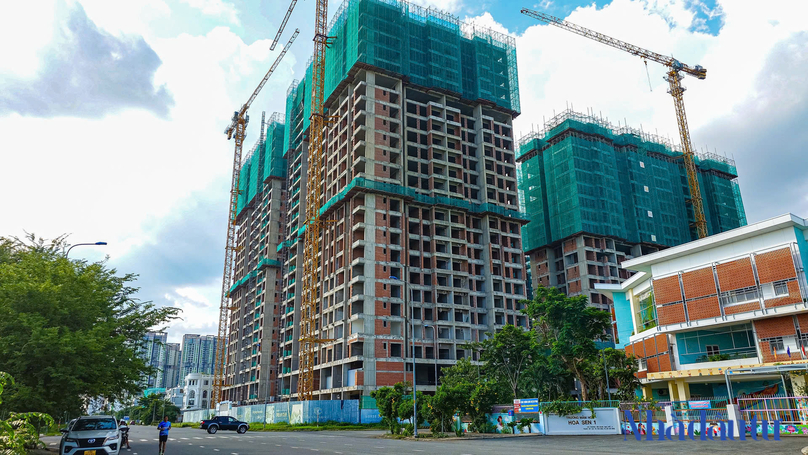
A real estate project under development. Photo by The Investor/Vu Pham.
As many experts forecast, the real estate market will start to improve from Q2/2025, with rising investor confidence. By the beginning of 2026, the sector is hoped to stabilize, with many segments making a comeback.
Once the revised Land Law, Housing Law, and Real Estate Business Law come to life with complete guidance, the “waiting” mentality will go away, and project developers will begin racing to remove bottlenecks with support from authorities. Developers will be more confident in releasing products, which will boost investor trust and encourage the flow of bank deposits into real estate.
However, at this time, most property developers are focusing on sales before deciding on plans for the next phase. Some developers, after gauging the market, have decided to push back their sales plans to 2025, waiting for a more favorable legal environment.
Many positive signs
The Vietnam National Real Estate Association (VnREA) reported that in 2024, although sales had recovered since the beginning of the year, most real estate developers still faced challenges in achieving their profit targets.
Data showed a significant decline of 20% in revenue and 43% in profit against 2023, largely due to a sharp decrease in handovers. Although the market showed some signs of recovery, it still felt the impact of previous backlogs, making it difficult for more than 60% of companies to meet their financial goals for 2024.
On the market, housing demand continued to remain high, with a positive absorption rate, reflecting strong growth in home loan activities. This suggested a clear recovery in buyer sentiment.
Nguyen Huong, CEO of Dai Phuc Land, noted that in Q2/2024, market sentiment started to recover. Developers actively launched new projects for sale, moving away from the cautious approach seen in 2022 and 2023.
“People began to spend money purchasing homes, with notable increases in transactions. Banks, instead of restricting real estate loans, offered reasonable home loan packages.
“Additionally, brokerage firms started actively recruiting staff again, expanding sales operations and product lines, rather than focusing on a single area or a single product category as they did previously. As real estate businesses grow, the market is expected to become more bustling,” she said.
In terms of product lines, Huong believed the market is experiencing a significant shift. In the South, the southeastern region will see strong growth in affordable apartment segments, while the Mekong Delta region will continue to focus on townhouses and land plots.
Similarly, Ngo Quang Phuc, CEO of Phu Dong Group, stated that at the end of 2024, the market showed some positive signs, but a breakout is not yet possible and will require more time.
“The recovery of the housing segment in large urban areas will create liquidity and drive the market. Furthermore, signs of economic recovery and efforts to bring the revised Housing Law, the revised Real Estate Business Law, and the revised Land Law into life will help boost investor confidence and remove legal bottlenecks,” he commented.
Regarding the company’s plans, Phuc said that Phu Dong is handing over the Phu Dong Sky Garden project in Di An town, Binh Duong province, which borders Ho Chi Minh City. The company also plans to launch the Phu Dong SkyOne project, also in Di An.
In preparation for the 2025 market, the firm is finalizing legal procedures for two other projects in Binh Duong. Of these, the 8-hectare Phu Dong 4 will feature two product lines: townhouses and apartments; while Phu Dong 6, spanning more than 6,000 square meters, will be a high-end apartment complex.
Ready for new growth cycle
Director of a real estate company in HCMC who declined to be named held that affordable housing that meets real needs will dominate in 2025.
The reason many companies are rushing to develop this product line is the absence of developers in this segment, while the demand is still substantial. Additionally, local housing development policies are also focusing on this type, the executive added.
A representative from Nam Long Group reported that the company’s sales in the first 11 months of 2024 reached VND4.6 trillion ($183.41 million). Of this, Phase 2 of the Akari City project contributed 37%, Southgate 31%, Can Tho 19%, and Mizuki Park 13%.
For 2025, Nam Long expects sales to be higher than the initial target for 2024 (VND9.55 trillion or $380.8 million), and profit after minority shareholder interests is projected to grow from last year.
Real estate revenue in Q4/2024 is expected to reach VND5.6 trillion ($233.3 million), significantly better than the low base in the first nine months of the year, which was only VND1.5 trillion ($59.8 million), mainly from projects like phase 2 of Akari City and Can Tho, which began handovers in October 2024.
Nam Long’s leadership anticipated that sales in 2025 will be boosted by the launch of the next phases of existing projects, as well as new projects like Nam Long Hai Phong and Paragon Dai Phuoc in Dong Nai province.
Meanwhile, Nguyen Van Hau, CEO of Asian Holding, said that the company plans to launch new products, including about 100 land plots in Dong Nai. These plots will be priced at VND12-13 million ($518) per square meter, and customers will immediately receive the land use rights certificate upon purchase.
Hau predicted that the remainder of this year will still be led by the apartment segment. The real estate market has only just begun to stabilize, with market participants still facing many difficulties due to previous economic impacts. Additionally, legal procedures related to land still encounter many unresolved issues, preventing many projects from moving forward.
“Although new related laws have come into effect, we must wait for guiding circulars to remove the legal bottlenecks, and only then will the market truly recover in 2025. More importantly, customer sentiment needs to be improved. Once this psychological barrier is removed, new capital will flow into real estate. As we have seen, recently, customers still carry a defensive mindset, hesitant to invest in properties,” he explained.
To prepare for the new market phase, Asian Holding is also reshaping its product lines. Instead of distributing products for other developers, Hau said his firm will focus on its own projects in Dong Nai and Binh Phuoc to launch this year.
You may like
-


Vietnam’s Exclusive Economic Zone boasts over 1,000 GW of wind power potential: report
-
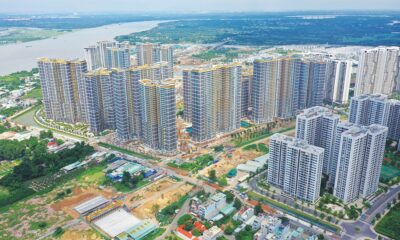

Uncertainty weighing on real estate
-


Central Vietnam city seeks $1.84 bln for 15 projects in economic zone
-
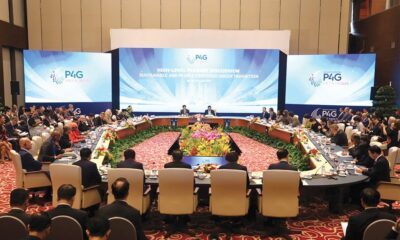

Green engagement rides high in Vietnam
-
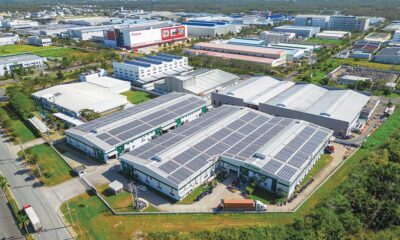

New standards being reached within green industrial parks
-
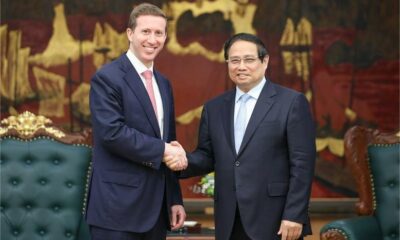

Vietnam PM asks Warburg Pincus to invest ‘further and faster’
Project
Vietnam’s Exclusive Economic Zone boasts over 1,000 GW of wind power potential: report
Published
9 months agoon
April 27, 2025Vietnam’s Exclusive Economic Zone (EEZ) has a wind power potential of 1,068 GW, nearly 470 GW more than previously estimated, according to a report released Friday by the National Center for Hydro-Meteorological Forecasting (NCHMF).
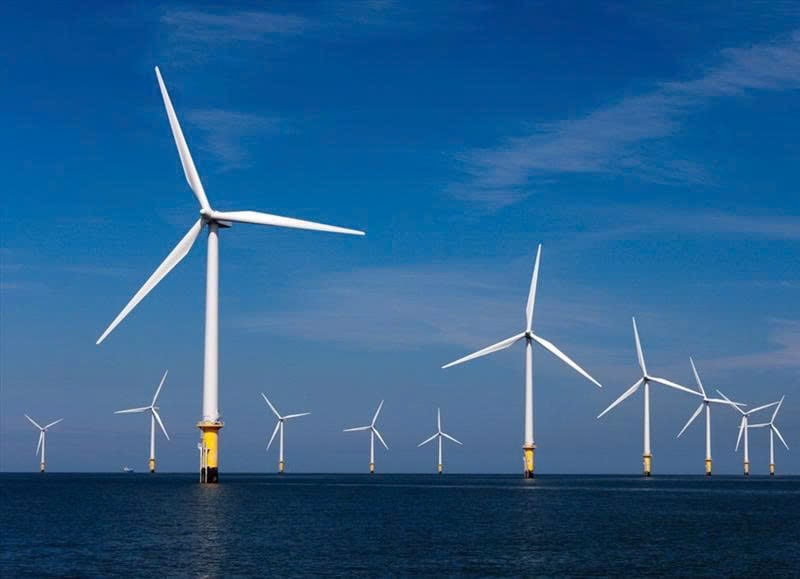
An offshore wind power project in Vietnam. Photo courtesy of VnEconomy.
The report, titled “Detailed Assessment of Wind Resource Potential in Coastal (up to 6 Nautical Miles) and Offshore Areas in Vietnam,” was conducted by the NCHMF with support from the United Nations Development Program (UNDP) and the Norwegian Embassy.
This wind potential was measured at a height of 100 meters above sea level, said Mai Van Khiem, director of the NCHMF. He noted that from November to February each year, wind capacity accounts for half of the annual total – peaking in December and gradually decreasing, with the lowest levels recorded in May.
The southern offshore areas account for 894 GW of this potential, while the northern areas contribute 174 GW.
In nearshore zones (up to 6 nautical miles), the total technical wind power potential is 57.8 GW. The Bac Lieu-Ca Mau region alone contributes nearly 30% of this, while the Ninh Thuan-Binh Thuan area accounts for 24 GW. Although the Quang Tri-Hue region has lower potential, it offers stable wind speeds during the winter months. The Red River Delta has a modest potential of 0.17 GW.
Compared to previous assessments, such as the World Bank’s 2021 study and data from the Global Wind Atlas (GWA), this report provides more detailed and higher-resolution information, both spatially and temporally.
“Notably, the EEZ potential outlined in this report exceeds the World Bank’s estimate by 469 GW, primarily due to the broader scope of the survey and more refined climate modeling using domestic observational data,” the research team explained.
They also emphasized the use of the Weather Research and Forecasting (WRF) model customized specifically for Vietnam, which enhanced the accuracy of the results.
The findings are based on wind data collected from 26 coastal and island meteorological stations, satellite sources from CCMP, ASCAT, and SCATSAT-1 (covering 30 years of ocean surface wind data), as well as buoy data from Nghe An province and seabed depth measurements.
A key innovation in this report is the integration of potential impacts from extreme weather events. Typhoons and tropical depressions occurring between August and October pose structural and safety risks to wind turbines. Meanwhile, strong winds and high waves during the northeast monsoon season can hinder access to and maintenance of offshore wind systems.
To support model calibration and long-term observation, the research team recommends increased investment in offshore wind monitoring stations at heights exceeding 100 meters. They also suggest incorporating these findings into offshore wind development strategies and national marine spatial planning.
Additionally, the team advocates for expanding research into other forms of marine renewable energy, such as wave, tidal, and ocean thermal energy.
“Vietnam has some of the most promising offshore wind resources in the region, creating a strong foundation for the development of a large-scale offshore wind industry. This will contribute to energy security, green economic growth, and the achievement of net zero commitments,” they said.
The study provides a vital scientific basis for policy planning, identifying priority development zones, attracting investment, building infrastructure, and training the future offshore wind workforce, the team added.
Hoang Duc Cuong, deputy director of the Department of Meteorology and Hydrology, emphasized that Vietnam lies within a strong and stable Asian monsoon belt, giving it abundant wind energy potential. He noted that this renewable source will play a key role in meeting the country’s climate change goals and advancing a low-carbon economy.
However, he also warned that marine-based natural disasters are highly complex and could significantly impact the stability of offshore wind operations and energy generation.
The ever-changing status of the global economy following last week’s tariff shocks continue to loom large among investors in Vietnam’s real estate market.
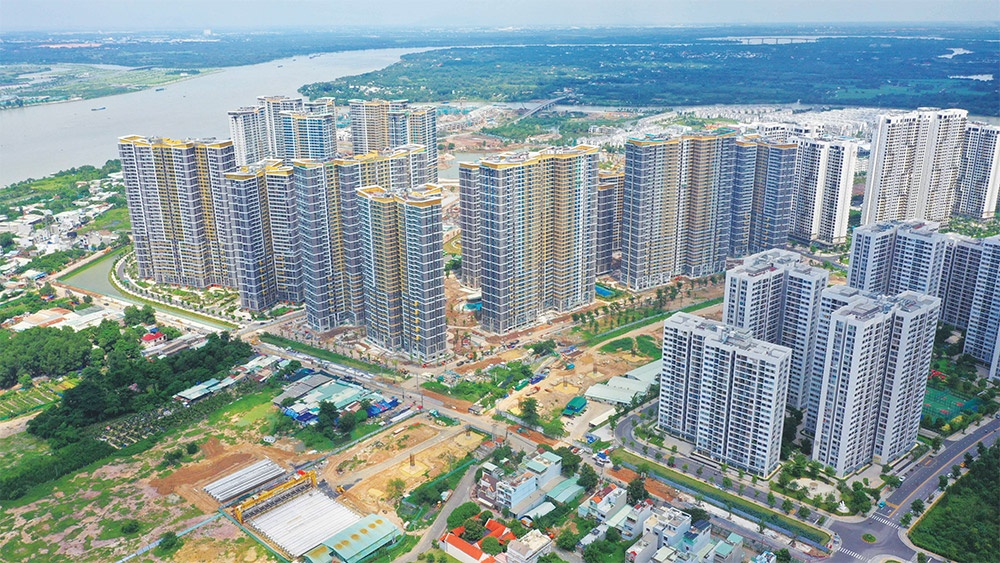 |
| All real estate segments are at risk of losing appeal if high global tariffs are eventually put in place, photo Le Toan |
Pham Lam, vice chairman of the Vietnam Real Estate Association, said that while it is premature to determine the full impact of new US import tariffs on Vietnam’s property market, early signs point to shaken investor sentiment and potential disruptions to foreign investment.
“If multinational corporations scale back or delay their factory expansion plans, the demand for land and factory leasing could decline, which may place downward pressure on industrial rents, lead to increased vacancy, and postpone new industrial zone developments,” he said. “This would affect key industrial property markets such as Bac Ninh, Bac Giang, Haiphong, Long An, and Binh Duong.”
Meanwhile, real estate expert Nguyen Hoang said that the United States remains one of the most critical export destinations for Vietnam’s foreign-invested enterprises.
“Any change in tariffs will significantly influence capital flows, investor confidence, and manufacturing strategies of companies operating in Vietnam. If a high tariff is fully implemented in 90 days, it could seriously diminish Vietnam’s investment appeal – affecting all real estate segments as a result,” Hoang said.
Vietnam’s property market has only recently emerged from a prolonged two-year downturn.
“It remains highly sensitive to economic and policy shocks. Investors have remained cautious, and any further external pressure could threaten to break the fragile liquidity recovery, potentially sending the market back into a period of short-term stagnation,” Hoang added.
Alex Crane, managing director of Knight Frank Vietnam, said that the recent tariff twists by the US casts a shadow of uncertainty, with potential implications for various segments of the market.
While manufacturing has shown resilience, it is still on the path to full recovery from the pandemic, particularly in labour-intensive sectors like garments and furniture. Tariffs imposed now would not have as severe an impact as they might have during Vietnam’s 2019 peak, but consequences are still expected, Crane said.
“I may expect that major transactions, especially those involving large capital outlays, are being paused or undergoing extended due diligence as investors and developers reassess assumptions and underwriting models and commercial occupiers are expected to defer large capital expenditures in the short term,” Crane said.
In addition, the response from the State Bank of Vietnam, particularly regarding monetary policy, will be crucial. While a rate cut may not effectively stimulate residential demand (as demonstrated in 2024), targeted lending for key industries and easing of loan-to-value ratios or debt-to-income limits for developers could provide relief.
“At present, most segments of the real estate market are in a holding pattern, awaiting clarity from the evolving negotiations between the Vietnamese and US governments. While uncertainty is unsettling, Vietnam’s underlying fundamentals remain sound, and the market’s long-term outlook is still viewed positively,” he added.
Nguyen Dung Minh, deputy CEO of MIK Group, has warned that under the new US tariff regime, many investors will be forced to reassess their strategies, likely leading to a decline in the demand for industrial land.
“Investors will need time to re-evaluate their actual demand and incoming orders and make necessary adjustments before they can fully gauge the extent of the impact,” Minh said.
He added that the implications go beyond just industrial land. “The new US tariffs are also expected to disrupt supply chains and negatively affect supporting sectors such as logistics, warehousing, and raw materials manufacturing. As production slows, so too will the demand for land associated with these services,” Minh said.
| Trang Bui, country head Cushman & Wakefield Vietnam
While the effects of tariffs are typically delayed, most economists warn that they may eventually fuel inflation and dampen economic growth. Many manufacturing firms could opt to postpone their expansion plans in the short term if export duties become too burdensome. There is also a possibility that some companies may look to diversify their supply chains towards a Vietnam+1 model, shifting parts of their operations to neighbouring countries. This could lead to a decline in demand for factories and warehouse leasing, two key drivers of the industrial real estate segment. However, it is important to recognise that industrial real estate is fundamentally a long-term investment. Vietnam has long positioned itself as the manufacturing hub of Southeast Asia, thanks to its strategic location and the “bamboo diplomacy” approach, which has enabled the country to swiftly join trade negotiations and sign multiple free trade agreements. Moreover, many manufacturers in Vietnam have already established tightly integrated supply chains. As such, their investment plans tend to operate on a much longer time horizon than the near-term effects of tariff policy. Relocating supply chains typically requires at least 3–5 years, making short-term shifts less likely. Overall, Vietnam’s industrial real estate sector has proven resilient under various political and economic conditions. Investors would do well to focus on long-term trends and structural advantages. Manufacturers, in particular, may take this opportunity to secure high-quality industrial assets, invest in automation, and pull in skilled labour, while continuing to monitor developments in upcoming trade negotiations with caution. Nguyen Thi Bich Ngoc, CEO, Sen Vang Group When it comes to the reciprocal tariff policy announced by the US, the greater danger currently lies not in the tariff itself, but in the heightened sense of uncertainty it has triggered across the Vietnamese market, a sentiment clearly reflected in recent VN-Index fluctuations. In the short term, the policy will weigh heavily on Vietnam’s industrial real estate sector. However, in the long run, this challenge could serve as a catalyst for stronger growth. It presents an opportunity for the government and industrial zone developers to rethink their strategies, offering more competitive, attractive solutions to both foreign and domestic investors. Rather than relying solely on external trends like the China+1 shift, Vietnam should leverage its inherent competitive advantages, including a strategic geographic location, a skilled and cost-effective labour force, and political stability, to pull in long-term investment. These are undeniable strengths that set Vietnam apart. Moreover, this is also an opportune moment for Vietnam to re-evaluate and restructure its key sectors, prioritising strategic industries with high growth potential. Continued engagement in bilateral and multilateral trade agreements will open up new opportunities and elevate Vietnam’s position both regionally and globally. Ultimately, we must seize this challenge as a turning point, transforming pressure into momentum for sustainable development. Vo Hong Thang, Investment director DKRA Group The industrial infrastructure, commercial, and residential real estate segments are all likely to face increasing headwinds if a huge tariff increase is eventually implemented. In recent years, a number of developers have made significant investments in industrial zones, betting on a continued influx of foreign direct investment. However, the new tariff policy raises the possibility of such flows being diverted to other countries. Vietnam now faces the risk of having built the nest, but being unable to attract the eagle. In addition, liquidity in both residential and commercial real estate, including retail, office, and hospitality, is likely to weaken in the short term due to more cautious investor sentiment, defensive capital flows, and reduced purchasing power from end-users. Niche investment segments such as serviced apartments, tourism-related accommodations, and foreign buyer housing could also see demand drop, particularly as the foreign expert and executive workforce, typically a key demand driver, scales back plans to live and work in Vietnam. |
Project
Central Vietnam city seeks $1.84 bln for 15 projects in economic zone
Published
9 months agoon
April 26, 2025Authorities of Hue city in central Vietnam have released a list of 15 projects in Chan May-Lang Co Economic Zone which will need VND47.5 trillion ($1.84 billion) in investment capital between 2025 and 2026.
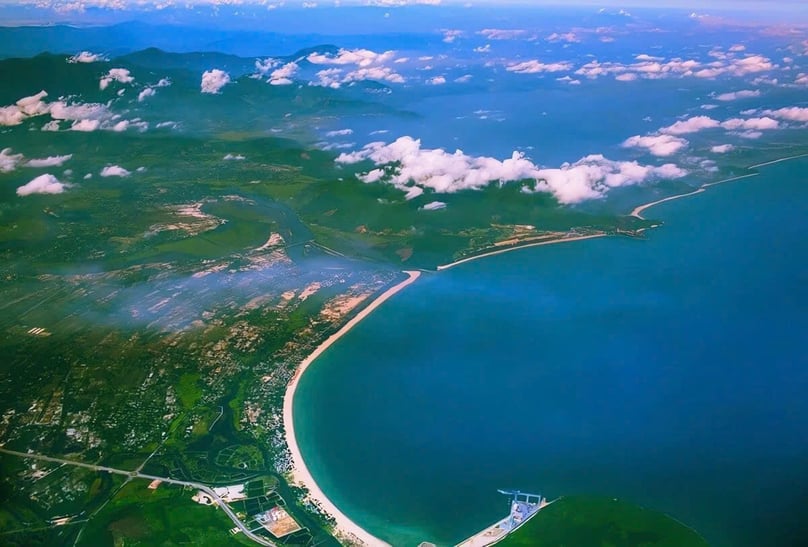
Chan May-Lang Co Economic Zone in Hue city, central Vietnam. Photo by The Investor/Dinh Duy.
Notable projects include the Chan May non-tariff zones No. 1 and 2 infrastructure development project, with a total area of over 503 hectares and combined investment capital of VND2.8 trillion ($108.23 million).
Another is the VND20 trillion ($773 million) Chan May Urban Area project (locations 1 and 2), which will cover 225 hectares and be implemented over five years.
The LNG terminal project at Chan May Port, 27 hectares with an investment of VND8.6 trillion ($332.43 million), is set for five-year implementation.
The 120-hectare Bai Ca eco-tourism project in Lang Co township will have investment capital of VND2.5 trillion.
The Lang Co beach resort, with an area of 45 hectares and total investment of VND4 trillion ($154.62 million), will be carried out over five years; while the 75-hectare Lap An lagoon tourism, urban development and resort complex in Lang Co township will cost VND6 trillion.
According to the management board of Hue Economic and Industrial Zones, since its establishment, Chan May-Lang Co Economic Zone has attracted 55 investment projects which remain valid, with total registered capital of VND97.32 trillion ($3.76 billion).
Among these, 15 are foreign-invested projects with combined capital of VND56.02 trillion ($2.17 billion), accounting for 57.56% of the total.
Several prominent foreign investors have established a presence in the zone, such as Banyan Tree Group (Singapore) with the Laguna Lang Co Resort and Winson Group (Taiwan) with the Billion Max Vietnam Export Processing Factory.
Chan May-Lang Co has become a destination for investments in sectors like tourism and resort development; seaport infrastructure; logistics; clean industry; and high-tech, environmentally friendly industries, with annual revenue reaching nearly VND4 trillion ($154.62 million) and tax contributions of around VND300 billion.
The management board said Hue city has proposed the Ministry of Construction review the adjustment of the EZ master plan through 2045, for submission to the Prime Minister.
The strategic goal is to develop Chan May-Lang Co into a key economic zone of central Vietnam – a coastal gateway offering logistics services for the central region and the East-West Economic Corridor, as well as a hub for high-end tourism services.
To attract investors, the local government will offer a range of incentives such as a 10% corporate income tax rate for 15 years from the first year the project generates revenue; import tax exemption for goods to create fixed assets for investment projects, and land and water surface rental exemptions, the board said.

Bac Giang International Logistics Centre launched

Vietnam’s Exclusive Economic Zone boasts over 1,000 GW of wind power potential: report

Uncertainty weighing on real estate

Central Vietnam city seeks $1.84 bln for 15 projects in economic zone

